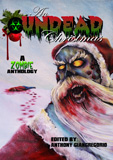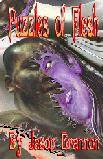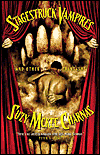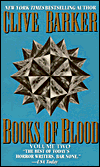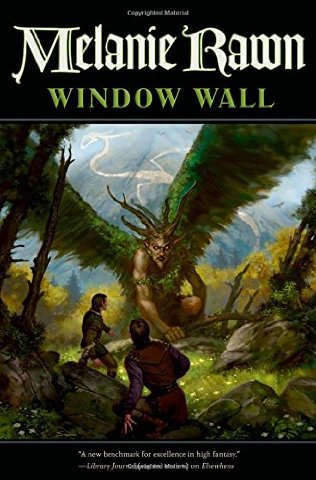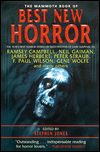
The Mammoth Book of Best New Horror 11, edited by Stephen Jones
Book Review by Paul Kane
Have you read this book?
I don't know about you, but when I was a kid I always used to look forward to the comic book annuals that came out about this time each year (obviously, as that's how they came by their name). Now that I'm grown up - well, sort of - and a fully-fledged, card-carrying horror fan, the 'annual' I look forward to the most is not a comic book at all, but rather The Mammoth Book of Best New Horror, which celebrates eleven successful volumes with this edition.
I'm sure most of you reading this will know the drill by now: an introduction by the editor offering a comprehensive run-down of all things horrific during the previous year (in this case 1999), and here stoking the fires of the e-book vs. real book debate, 'Although this new technology is still in its infancy, there is little doubt that electronic publication is here to stay. However, I would like to believe that no matter what advances we see over the coming years, no e-book is ever going to replace the purely tactile pleasure of holding a handsomely-crafted volume....'; a collection of short stories and novellas reprinted from that year with brief biogs and insights from the authors (F. Paul Wilson: 'While hunting up a way to put a different spin on such a hoary theme, I came across an article about a support group for survivors of lightening strikes. Survivors? Could there be that many? Turned out there were.'); a necrology of people in the various industries who died during this twelve month period; and a list of very useful addresses in the back, giving you access to organisations such as The British Fantasy Society and the Horror Writers Association, as well as relevant booksellers and magazines.
So without further ado let's get straight to the fiction, which, after all, makes up the bulk of the book. There are some absolutely fantastic shorts in store for you this time, and Steve Rasnic Tem sets the tone nicely with his 'Halloween Street' stories, based in an extremely spooky neighbourhood. The impressive vignettes in his 'Tricks and Treats...' work better than the longer one at the start of the collection, but all are worthy of attention ('The dead liked playing tricks. Dying was a great trick.'). T.E.D Klein's 'Growing Things' is a disturbing yarn about a couple who find a stash of old gardening and handyman magazines in their new abode, containing some pertinent advice columns. While in 'Unhasped' David J. Schow meditates on lost 'loves' and secret passions, locked up inside an old cigar box ('Valerie was best thumbnailed as ebullient, long of leg and stout of breast and ready to party.'): watch out for the twist ending, an oldie but a goodie.
'The Emperor's Old Bones' by Gemma Files, however, is quite possibly one of the best pieces I've ever read, in any anthology. Inspired by a legendary oriental dish she saw on The Discovery Channel, she's created a sad, unforgettable tale with perfect pace ("Tai pan," he said, finally, "for such a meal one must provide the meat oneself."). Ramsey Campbell's self-confessed Ligotti tribute 'The Entertainment' and Neil Gaiman's 'Harlequin Valentine' are both good, too - the former about a man who unwittingly provides the 'entertainment' of the title at a geriatric-ridden seaside boarding house, the latter about an invisible Harlequin who loses his heart (literally) to a woman on February 14th with startling consequences.
In 'Just Like Eddy' Kim Newman touches on a subject many of us will be familiar with, the misspelling of Edgar Allan Poe, attributing all the bad things that happened to the author to his doppelgänger, Allen ('I set out to find him, and put an end to this sorry business between us. I knew he could be no more than a projection, a ghost before his time, escaped from my body but attached by a golden thread.'). Whereas in the superb 'Lulu', Thomas Tessier introduces us to the embodiment of fictional stimulus, a woman known by countless names but with the power to help all artists reach their full potential.
'The Ballyhooly Boy', genre favourite Graham Masterton's creepy ghost story about a man whose childhood bullying returns to haunt him, is marred only by the writer's insistence on an inexplicable monster finale ('But beside the bed stood a huge and complicated creature that I could hardly even begin to understand....'). Something Michael Marano purposely avoids in his controversial AIDS account 'Burden', adequately capturing the devastating grief and uncontrollable fear generated by the illness. Then Paul J. McAuley's 'Naming the Dead' presents us with a slightly tongue-in-cheek take on The Frighteners and The Sixth Sense, about a 'detective' who has a fondness for the Victorian era and an uncanny knack of seeing the late lamented.
Of the longer tales included, my favourites were Tim Lebbon's 'White', naturally, (a group of people holed up in a mansion in post-apocalyptic snowbound Cornwall, defending themselves against ferocious white beasts intent on killing them all - what's not to like?), F. Paul Wilson's 'Aftershock' (a doctor discovers that the only way he can see his dead daughter again is to get struck - repeatedly - by lightening: 'The tower seemed to explode. I had an instant's impression of a deafening buzz accompanied by a rainbow shower of sparks within a wall of blazing light...'), and David Case's 'Jimmy' (a multi-layered story of evolutionary experimentation gone wrong in a small American village).
Of course, with a collection of this size (572 pages in total - about a hundred more than last year) and variety it's inevitable that you're going to find some pieces you don't like. For instance, I was less fond of 'The Long Hall on the Top Floor' by Caitlín R. Kiernan - I've tried really hard to like her stuff but the fractured style just puts me off ('And some guy sitting next to him all the way, smoking Kools, black guy named Owen smoking Kools and watching the interstate night slip by outside...') - and felt that 'The Stunted House' from Terry Lamsley and Michael Marshall Smith's 'Welcome' weren't really their finest efforts, the first following a couple who encounter a strange house on the cliffs, and the second about a computer glitch that turns out not to be. Similarly, 'A Fish Story' by Gene Wolfe develops into a non-ghostly ghost anecdote, and Peter Straub's novella 'Pork Pie Hat' comes across as two different narratives trying desperately to gel - although his obvious enthusiasm for Jazz music is infectious. Also, as much as I love James Herbert, I can't quite see the point of taking up space with an excerpt from his novel Others. Surely the target audience will have read the entire thing by now anyway, and does he really need the publicity? He's James Herbert for Heaven's Sake!
That said, you know you're going to get your money's worth from Best New Horror come what may, and I sincerely hope that this is one mammoth that never becomes extinct.
I'm sure most of you reading this will know the drill by now: an introduction by the editor offering a comprehensive run-down of all things horrific during the previous year (in this case 1999), and here stoking the fires of the e-book vs. real book debate, 'Although this new technology is still in its infancy, there is little doubt that electronic publication is here to stay. However, I would like to believe that no matter what advances we see over the coming years, no e-book is ever going to replace the purely tactile pleasure of holding a handsomely-crafted volume....'; a collection of short stories and novellas reprinted from that year with brief biogs and insights from the authors (F. Paul Wilson: 'While hunting up a way to put a different spin on such a hoary theme, I came across an article about a support group for survivors of lightening strikes. Survivors? Could there be that many? Turned out there were.'); a necrology of people in the various industries who died during this twelve month period; and a list of very useful addresses in the back, giving you access to organisations such as The British Fantasy Society and the Horror Writers Association, as well as relevant booksellers and magazines.
So without further ado let's get straight to the fiction, which, after all, makes up the bulk of the book. There are some absolutely fantastic shorts in store for you this time, and Steve Rasnic Tem sets the tone nicely with his 'Halloween Street' stories, based in an extremely spooky neighbourhood. The impressive vignettes in his 'Tricks and Treats...' work better than the longer one at the start of the collection, but all are worthy of attention ('The dead liked playing tricks. Dying was a great trick.'). T.E.D Klein's 'Growing Things' is a disturbing yarn about a couple who find a stash of old gardening and handyman magazines in their new abode, containing some pertinent advice columns. While in 'Unhasped' David J. Schow meditates on lost 'loves' and secret passions, locked up inside an old cigar box ('Valerie was best thumbnailed as ebullient, long of leg and stout of breast and ready to party.'): watch out for the twist ending, an oldie but a goodie.
'The Emperor's Old Bones' by Gemma Files, however, is quite possibly one of the best pieces I've ever read, in any anthology. Inspired by a legendary oriental dish she saw on The Discovery Channel, she's created a sad, unforgettable tale with perfect pace ("Tai pan," he said, finally, "for such a meal one must provide the meat oneself."). Ramsey Campbell's self-confessed Ligotti tribute 'The Entertainment' and Neil Gaiman's 'Harlequin Valentine' are both good, too - the former about a man who unwittingly provides the 'entertainment' of the title at a geriatric-ridden seaside boarding house, the latter about an invisible Harlequin who loses his heart (literally) to a woman on February 14th with startling consequences.
In 'Just Like Eddy' Kim Newman touches on a subject many of us will be familiar with, the misspelling of Edgar Allan Poe, attributing all the bad things that happened to the author to his doppelgänger, Allen ('I set out to find him, and put an end to this sorry business between us. I knew he could be no more than a projection, a ghost before his time, escaped from my body but attached by a golden thread.'). Whereas in the superb 'Lulu', Thomas Tessier introduces us to the embodiment of fictional stimulus, a woman known by countless names but with the power to help all artists reach their full potential.
'The Ballyhooly Boy', genre favourite Graham Masterton's creepy ghost story about a man whose childhood bullying returns to haunt him, is marred only by the writer's insistence on an inexplicable monster finale ('But beside the bed stood a huge and complicated creature that I could hardly even begin to understand....'). Something Michael Marano purposely avoids in his controversial AIDS account 'Burden', adequately capturing the devastating grief and uncontrollable fear generated by the illness. Then Paul J. McAuley's 'Naming the Dead' presents us with a slightly tongue-in-cheek take on The Frighteners and The Sixth Sense, about a 'detective' who has a fondness for the Victorian era and an uncanny knack of seeing the late lamented.
Of the longer tales included, my favourites were Tim Lebbon's 'White', naturally, (a group of people holed up in a mansion in post-apocalyptic snowbound Cornwall, defending themselves against ferocious white beasts intent on killing them all - what's not to like?), F. Paul Wilson's 'Aftershock' (a doctor discovers that the only way he can see his dead daughter again is to get struck - repeatedly - by lightening: 'The tower seemed to explode. I had an instant's impression of a deafening buzz accompanied by a rainbow shower of sparks within a wall of blazing light...'), and David Case's 'Jimmy' (a multi-layered story of evolutionary experimentation gone wrong in a small American village).
Of course, with a collection of this size (572 pages in total - about a hundred more than last year) and variety it's inevitable that you're going to find some pieces you don't like. For instance, I was less fond of 'The Long Hall on the Top Floor' by Caitlín R. Kiernan - I've tried really hard to like her stuff but the fractured style just puts me off ('And some guy sitting next to him all the way, smoking Kools, black guy named Owen smoking Kools and watching the interstate night slip by outside...') - and felt that 'The Stunted House' from Terry Lamsley and Michael Marshall Smith's 'Welcome' weren't really their finest efforts, the first following a couple who encounter a strange house on the cliffs, and the second about a computer glitch that turns out not to be. Similarly, 'A Fish Story' by Gene Wolfe develops into a non-ghostly ghost anecdote, and Peter Straub's novella 'Pork Pie Hat' comes across as two different narratives trying desperately to gel - although his obvious enthusiasm for Jazz music is infectious. Also, as much as I love James Herbert, I can't quite see the point of taking up space with an excerpt from his novel Others. Surely the target audience will have read the entire thing by now anyway, and does he really need the publicity? He's James Herbert for Heaven's Sake!
That said, you know you're going to get your money's worth from Best New Horror come what may, and I sincerely hope that this is one mammoth that never becomes extinct.
| The Mammoth Book of Best New Horror 11, edited by Stephen Jones on Amazon |
The Mammoth Book of Best New Horror 11, edited by Stephen Jones on Amazon

| More Books You Might Like |
Comment on The Mammoth Book of Best New Horror 11, edited by Stephen Jones
| Comments on The Mammoth Book of Best New Horror 11, edited by Stephen Jones |
| There are no comments on this book. |
